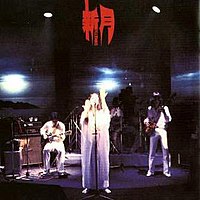Shingetsu
| Shingetsu | |
|---|---|

Shingetsu performing in ABC Kaikan Hall Tokyo, on July 25–26, 1979 (cover for "Shingetsu Live Akaime").
|
|
| Background information | |
| Origin | Japan |
| Genres | Progressive rock |
| Years active | 1976–1982 |
| Labels | Musea |
| Associated acts | Makoto Kitayama |
| Past members |
Makoto Kitayama Haruhiko Tsuda Akira Hanamoto Shizuo Suzuki Naoya Takahashi |
| Shingetsu | |
|---|---|
 |
|
| Studio album by Shingetsu | |
| Released | 1979 |
| Genre | Progressive rock |
Shingetsu (Japanese: 新月) was a Japanese progressive rock band from the 1970s. A band with a short career, they have typically been categorised as one of the most notable exponents of progressive rock music.
Shingetsu ('new moon') arrived in the Japanese music scene on the late 1970s. Led by the "Japanese Peter Gabriel", Makoto Kitayama (recognized for his deep, wavering, mournful vocals), Shingetsu's cinematic progressive sound gained comparisons to peak-time Genesis and recognition overseas.
Consisting of Kitayama, Akira Hanamoto, Naoya Takahahi, Shizuo Suzuki and Haruhiko Tsuda, the band only lived long enough to produce one studio album, followed in later years by two live albums, which nevertheless featured some unreleased performances.
Their studio album, the eponymous Shingetsu, often considered as a masterpiece of symphonic prog, is abundant in musical arrangements: the tasteful use of soft organ/synth soundscapes, Mellotron, and 12-string guitar passages reminiscent of the UK bands of the 1970s, while Kitayama's vocals give Shingetsu a distinctive edge from western bands.
Disambiguation for the word shingetsu:
Shingetsu is a shakuhachi honkyoku piece from the Dokyoku repertoire. The word shin means heart, mind, or spirit. The word getsu means moon, which is a symbol for enlightenment or perfection. Thus, the name of the piece can be taken to mean heart moon or spirit perfection or enlightenment of the mind. The piece is the slowest and most quiet in the Dokyoku repertoire.
"Shingetsu" has been recorded by many shakuhachi artists, including Watazumi Doso, Yokoyama Katsuya, and Alcvin Takegawa Ramos.
...
Wikipedia
